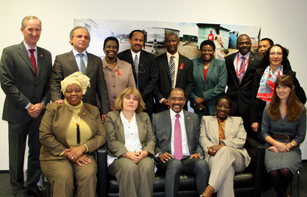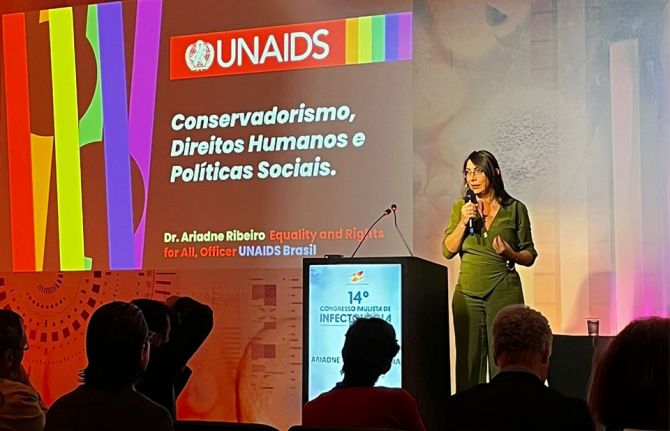
Feature Story
African leaders define shared responsibility for the AIDS response
20 November 2011
20 November 2011 20 November 2011
Credit: UNAIDS
“Africa is taking ownership of its AIDS response”. That was the message sent by all participants during a consultation organized by UNAIDS on 16 November 2011 at UNAIDS Headquarters in Geneva.
The UNAIDS Executive Director convened a group of high level representatives from leading political, economic and regional institutions in Africa to identify the changes that will be required to the way decisions and investments are made and to the roles played by governments, donors and civil society in the response.
The aim of the consultation was to identify opportunities to mobilize African and other leaders to accelerate progress towards the new goals of the 2011 Political Declaration on HIV/AIDS, particularly the elimination of HIV infections among children and putting 15 million people on HIV treatment by 2015. The group offered a series of proposals on how to create a socially sustainable agenda for AIDS given the challenges and opportunities of a complex, varied and quickly evolving context.
“The message we need to take to leaders is that they have the power to create change in their countries,” said the meeting co-chair, Commissioner Bience Gawanas of the African Union Commission.
Much of the discussion recounted how the world has moved on from the donor/recipient development paradigm that characterized the past 50 years. Participants cast an image of a very different Africa emphasizing key developments including its remarkable economic growth, the rising share of working age people to further foster growth and increased access to technology and communication. Also highlighted was the increasing number of countries no longer dependent on aid and the accompanying leadership and independence it has brought.
The message we need to take to leaders is that they have the power to create change in their countries
Commissioner Bience Gawanas of the African Union Commission.
According to participants, ushering in a new era of shared responsibility will depend on seizing these opportunities as well as responding to several remaining challenges including the lack of a strong African voice in global health governance, a pervasive “dependency mindset” and Africa’s unsustainable reliance on foreign-produced and -funded HIV treatment.
Participants explored how to better engage parliamentarians, civil society, regional economic commissions, the private sector and ministers of finance and foreign affairs, recognizing that all have a key role to play in sustaining the response. They also discussed innovative, African-owned accountability mechanisms like AIDS Watch Africa and the Campaign on Accelerated Reduction of Maternal, New Born and Child Mortality. New South-South and innovative continent-wide resource mobilization initiatives, such as those led by the African Development Bank, were also explored.
Participants included Dr Agnes Soucat, African Development Bank; Honourable Gilbert Mangole, Member of Parliament of Botswana; Ms Thokozile Ruzvidzo, United Nations Economic Commission for Africa; Dr Lucica Ditiu, StopTB Partnership; Dr Akram Ali Eltom, Global Fund to Fight AIDS, Tuberculosis and Malaria; Dr Alvaro Bermejo, International HIV/AIDS Alliance; Dr. Jeanetta K. Johnson, West African Health Organization; and Dr Faria de Brito Carlos Pedro, West African Health Organization. The consultation was held on 16 November 2011 at UNAIDS Headquarters in Geneva.
UNAIDS Executive Director Michel Sidibé stated that “leaders understand that the response is not about cost, it is about investing in the transformation of our societies.” Participants concluded that the urgency now is to engage African leaders in nationally-led processes to redefine the AIDS response and reprogramme investments based on national priorities.
Related
 Upholding dignity for everyone: Ariadne Ribeiro Ferreira
Upholding dignity for everyone: Ariadne Ribeiro Ferreira

21 November 2024

